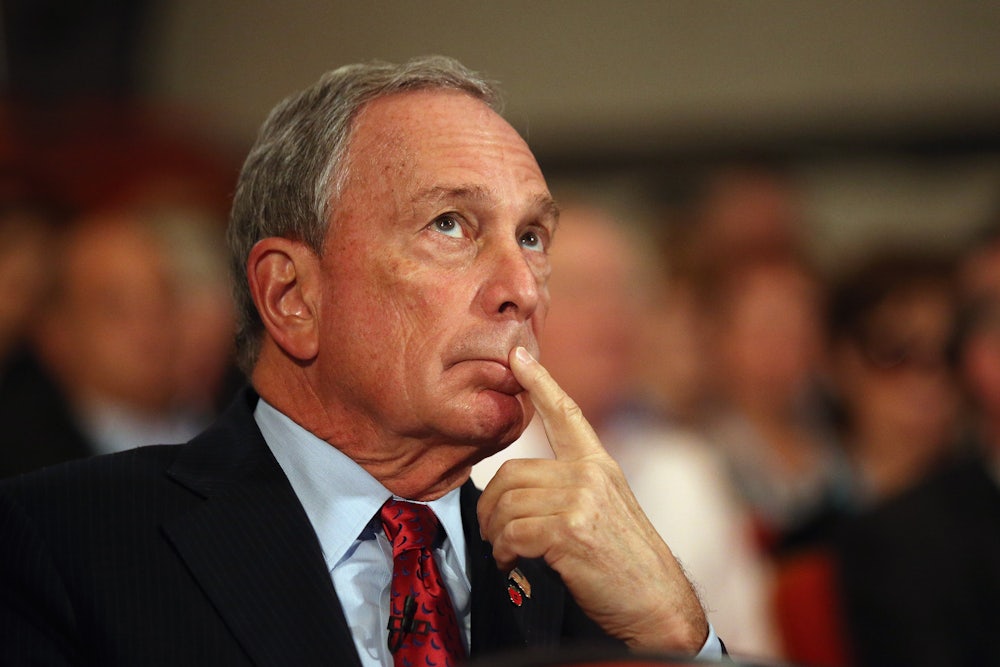For most journalists, covering Michael Bloomberg’s late entry into the 2020 presidential race will be straightforward. Some will focus on his three terms as mayor of New York City, interrogating his plutocratic style of politics and his steadfast support for racist policing. Many will write about his bizarre primary strategy (he’s skipping the first four races and banking on big wins in big states that vote later, like California and, uh, Alabama) and anti-democratic efforts to buy the Democratic nomination by flooding the airwaves with advertisements (he is spending a Steyer-ish $34 million through December 3). All will likely run elaborate behind-the-scenes ticktocks when the strategy fails to pay off and a stream of disgruntled aides start calling up their favorite reporters to bitch about all the time and money Michael Bloomberg has wasted on his vanity campaign for president.
For the 2,700 journalists and analysts who work for Bloomberg’s eponymous news organization, however, his campaign poses a serious conundrum. The conflict of interest is obvious. Reporting on any of Bloomberg’s Democratic rivals, in any way, would lead to accusations of bias. Ditto reporting on Donald Trump, who would be Bloomberg’s general election opponent if he were to win the primary.
Bloomberg has taken steps to address the issue—but, so far, they have been all the wrong steps. One of Bloomberg’s first actions as candidate was to blur the lines between his political campaign and his journalistic interests, recruiting David Shipley and Tim O’Brien, who serve as senior executive editor and executive editor of Bloomberg Opinion, to join his campaign.
Then, on Monday, Bloomberg Editor in Chief John Micklethwait announced a series of new rules in a memo to staff. Instead of declaring open season on its billionaire boss, without fear or favor, Bloomberg would cover … none of the presidential candidates. “We will continue our tradition of not investigating Mike (and his family and foundation), and we will extend the same policy to his rivals in the Democratic primaries,” Micklethwait wrote. “We cannot treat Mike’s Democratic competitors differently from him.” Trump will not be extended this courtesy, however.
Pity the political journalists at Bloomberg News, who will effectively have to sit out the Democratic primary. And by excluding Trump from its media blackout, Bloomberg has created yet another ethical bind that is already being attacked by conservatives. Any negative story about the president will be seen as politically motivated bias. Even stories not directly related to the president—stories that, for instance, affect markets, Bloomberg’s main area of coverage—are likely to be attacked by the president and his rivals. If the economy begins to slow, or if the Federal Reserve does something Trump doesn’t like, and Bloomberg reports those stories, it would be immediately discredited for helping the Democratic candidates for president.
There’s only one way out of this bind, and it isn’t Bloomberg News sitting out the Democratic primary. It’s Michael Bloomberg fully divesting himself from his media empire.
Bloomberg News has dealt with a version of this problem before. During Bloomberg’s time as mayor of New York City, The New York Times summed up the dilemma faced by its City Hall reporter as “inherently problematic: cover the mayor too positively and risk looking like a shill; cover the mayor too negatively and risk the ire of the man who pays his salary.” Bloomberg recognizes the problem. Asked about the implications of a potential presidential run for his company, during a 2018 radio interview, he said, “Quite honestly, I don’t want all the reporters I’m paying to write a bad story about me.”
Bloomberg was laughing when he said this, but it’s not clear that he was joking. The rules laid out by Micklethwait go out of their way to protect Bloomberg from his own journalists. There’s a fine line between preserving the reputation of the news organization and shielding the ego of its owner.
In fact, as currently constituted, the plan seems guaranteed to damage Bloomberg News’s journalistic reputation. As The Daily Mail’s David Martosko tweeted, the approach easily plays into the president’s ongoing anti-press narrative. “I predict Trump rallies will include this: ‘Is there a Bloomberg reporter back there in the fake news section? They fly on Air Force One every day and chase me around, but Little Mike won’t let them investigate ANY Democrats. It’s crooked as hell,’” Martosko wrote. The Wall Street Journal’s James Freeman previewed a coming Republican attack, writing, “At least one media empire is explicitly promising a double standard in its coverage of the presidential primary campaign.”
If Bloomberg were to win the nomination and the presidency, it’s not clear how the organization would report on anything without constant scrutiny and accusations of bias. Bloomberg has suggested in the past that he would divest his media company if he ran for president, saying less than a year ago, “I think at my age, if selling it is possible, I would do that. At some point, you’re going to die anyway, so you want to do it before then.” He says he is serious about winning, so there is really only one acceptable path forward: If Bloomberg won’t let his reporters investigate himself and his rivals, he should get out of the journalism business altogether.
